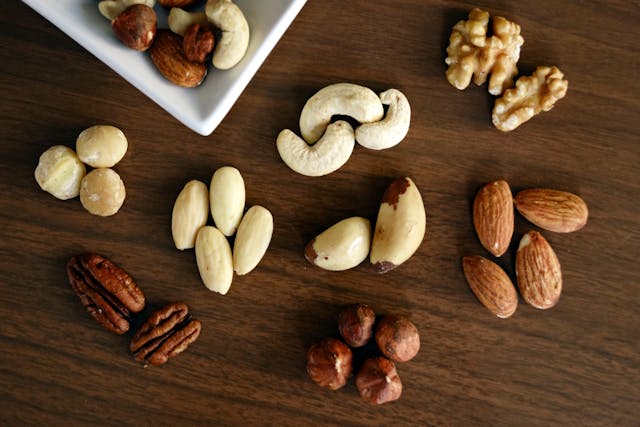Introduction to Nuts and Seeds in a Dog’s Diet
The inclusion of nuts and seeds in a dog’s diet is a topic that merits careful consideration by pet owners. While dogs are omnivorous and can consume a variety of foods, not all nuts and seeds are suitable for their dietary needs. Commonly encountered options include cashews, almonds, and pumpkin seeds, each possessing distinct nutritional profiles that can offer health benefits when provided in moderation.
Nuts and seeds can be a rich source of essential nutrients such as proteins, healthy fats, vitamins, and minerals. For instance, pumpkin seeds are packed with antioxidants and can contribute to a dog’s overall health, notably benefiting their skin and coat. Similarly, cashews contain beneficial minerals like copper and magnesium, which can support various bodily functions. However, while these contributions are noteworthy, the fat content in nuts can lead to digestive issues if consumed excessively, making portion control vital.
It is crucial for pet owners to understand that not all nuts are safe for canine consumption. Some variations, such as macadamia nuts, can be toxic to dogs and cause adverse reactions. Thus, when introducing any new food into a pet’s diet, it is advisable to consult with a veterinarian. A qualified professional can provide tailored recommendations based on the individual needs of the pet, ensuring both safety and health benefits.
Beyond the specific types of nuts and seeds, pet owners should be aware of their dogs’ unique dietary requirements and potential allergies. Introducing treats into a dog’s diet requires gradual steps and close monitoring for any signs of distress or allergic reactions. This approach is necessary for maintaining the health and well-being of our canine companions, making it imperative to proceed with caution and informed decisions when considering nuts and seeds.
Are Cashews Safe for Dogs?
Cashews, a popular nut known for their creamy texture and nutritional benefits for humans, raise questions about their safety for dogs. While cashews are not toxic to dogs, it is essential to consider the potential health benefits and risks associated with their consumption. Cashews contain vital nutrients such as vitamins E and K, magnesium, potassium, and healthy fats, which can contribute positively to a dog’s overall health when offered in moderation.
One of the main advantages of introducing cashews into a dog’s diet is their high antioxidant content. Antioxidants can help combat oxidative stress in dogs, promoting better immune function and healthier skin and coat. Moreover, the minerals found in cashews, such as magnesium, support muscular and neural functions, which can be beneficial for active dogs. However, the saturated fat content in cashews must be taken into consideration, particularly for dogs prone to obesity or pancreatitis. Excessive fat intake can lead to serious health issues, necessitating careful monitoring of portion sizes.
Available in Amazon
Bakson Veterinary | Derm Aid Drops | 30 ML
₹250.00 (as of November 23, 2024 01:46 GMT +00:00 - More infoProduct prices and availability are accurate as of the date/time indicated and are subject to change. Any price and availability information displayed on [relevant Amazon Site(s), as applicable] at the time of purchase will apply to the purchase of this product.)Bark Out Loud by Vivaldis- Antimicrobial Skin Spray for Dogs & Cats - Relieve Itching, Hot Spots, Allergies, and Wounds with 99.9% Microbe-Killing Power (100 ml, 1 Piece)
₹395.00 (as of November 23, 2024 01:46 GMT +00:00 - More infoProduct prices and availability are accurate as of the date/time indicated and are subject to change. Any price and availability information displayed on [relevant Amazon Site(s), as applicable] at the time of purchase will apply to the purchase of this product.)Bowlers Nutrimax Chicken and Milk Puppy Dog Food 1.2 Kg
₹220.00 (as of November 23, 2024 01:46 GMT +00:00 - More infoProduct prices and availability are accurate as of the date/time indicated and are subject to change. Any price and availability information displayed on [relevant Amazon Site(s), as applicable] at the time of purchase will apply to the purchase of this product.)Calcium & Vitamin Syrup for Dogs, 500 ml
₹325.00 (as of November 23, 2024 01:46 GMT +00:00 - More infoProduct prices and availability are accurate as of the date/time indicated and are subject to change. Any price and availability information displayed on [relevant Amazon Site(s), as applicable] at the time of purchase will apply to the purchase of this product.)Canine Creek Canine Creek Puppy 1.2kg Chicken 1.2 kg Dry New Born Dog Food Chicken Dry New Born Dog Food
₹659.00 (as of November 23, 2024 01:46 GMT +00:00 - More infoProduct prices and availability are accurate as of the date/time indicated and are subject to change. Any price and availability information displayed on [relevant Amazon Site(s), as applicable] at the time of purchase will apply to the purchase of this product.)Cature Dog and Cat Audishield Ear Drop Infection Treatment Herbal Ear Drops for Ear Hygiene for All Dogs 50ml
₹199.00 (as of November 23, 2024 01:46 GMT +00:00 - More infoProduct prices and availability are accurate as of the date/time indicated and are subject to change. Any price and availability information displayed on [relevant Amazon Site(s), as applicable] at the time of purchase will apply to the purchase of this product.)Cature Optishield Eye Drops for Dogs Eye Wash Relieve Keeps Pets Eyes Healthy Clears Dust or Other Particles in Eyes Refreshes Tired Eyes 50ml
₹199.00 (as of November 23, 2024 01:46 GMT +00:00 - More infoProduct prices and availability are accurate as of the date/time indicated and are subject to change. Any price and availability information displayed on [relevant Amazon Site(s), as applicable] at the time of purchase will apply to the purchase of this product.)Chappi Adult (1+ Years) Dry Dog Food, Chicken & Rice, 20 kg, Complete and Balanced Food for Adult Dogs,
₹2,852.00 (as of November 23, 2024 01:46 GMT +00:00 - More infoProduct prices and availability are accurate as of the date/time indicated and are subject to change. Any price and availability information displayed on [relevant Amazon Site(s), as applicable] at the time of purchase will apply to the purchase of this product.)Dofo All Stage Dog Food 2kg, Fresh Chicken & Vegetables – Balanced Nutrition for Adults
₹1,250.00 (as of November 23, 2024 01:46 GMT +00:00 - More infoProduct prices and availability are accurate as of the date/time indicated and are subject to change. Any price and availability information displayed on [relevant Amazon Site(s), as applicable] at the time of purchase will apply to the purchase of this product.)Dog Toothbrush, Dual Headed Dental Hygiene Convenient Soft Toothbrush To Clean Pet Teeth, Easy Teeth Cleaning & Dental Care, Dog Brush For Teeth For Small To Large Dogs, Cats, And Most Pets (Green) (1)
₹179.00 (as of November 23, 2024 01:46 GMT +00:00 - More infoProduct prices and availability are accurate as of the date/time indicated and are subject to change. Any price and availability information displayed on [relevant Amazon Site(s), as applicable] at the time of purchase will apply to the purchase of this product.)When considering feeding cashews to your dog, it is crucial to keep serving sizes minimal. A few cashews as an occasional treat are sufficient; larger quantities can result in digestive upset or obesity. A general guideline is to limit cashews to no more than one or two nuts per 10 pounds of body weight. Additionally, cashews should always be offered unsalted, unseasoned, and preferably raw or roasted without added oils. Before incorporating cashews into your dog’s diet, it is advisable to consult with a veterinarian to ensure suitability based on your dog’s health and dietary needs.
Almonds and Their Impact on Dogs
Almonds are a popular snack among humans, but their impact on dogs raises important considerations. While almonds are not toxic to dogs, they present several challenges that pet owners should be aware of. One major concern is the risk of choking. Almonds are hard and can pose a choking hazard, particularly for smaller breeds or dogs that tend to gulp food without chewing. This risk is compounded by the fact that some dogs may not have the teeth necessary to break down nuts effectively.
Gastrointestinal discomfort is another significant issue associated with almonds in dogs. Because dogs’ digestive systems are not designed to process high-fat foods like almonds, consuming them may lead to symptoms such as stomach upset, gas, or diarrhea. Additionally, the rich content of almonds can lead to pancreatitis in some cases, which is a serious inflammatory condition of the pancreas that can require veterinary attention.
It is also essential to be aware of the possibility of allergic reactions. Although rare, some dogs may develop allergies to almonds, with symptoms ranging from mild to severe. Common signs of an allergic reaction include itching, swelling, gastrointestinal upset, or even more serious symptoms like difficulty breathing. If any signs of distress occur after offering almonds to a dog, it is crucial for owners to seek veterinary advice immediately.
If dog owners decide to offer almonds to their pets, it is vital to do so cautiously. Only offer small amounts of unsalted, plain almonds, and always ensure that they are broken into smaller pieces to reduce the risk of choking. Monitoring the dog for any adverse reactions post-consumption can also help identify any potential issues early on. Ultimately, while almonds may not be outright dangerous, careful consideration and vigilance are essential when incorporating them into a dog’s diet.
The Benefits and Precautions of Pumpkin Seeds for Dogs
Pumpkin seeds, also known as Pepitas, offer numerous health benefits for dogs, making them a nutritious addition to their diet. One of the primary advantages of including pumpkin seeds is their positive impact on urinary health. These seeds contain compounds such as cucurbitacin, which can help to flush out toxins and promote the overall health of the urinary tract. Additionally, the high magnesium and zinc content found in pumpkin seeds contributes to canine immune system support, enhancing their body’s natural defenses against illness.
Moreover, pumpkin seeds are rich in antioxidants and healthy fats, which can assist in maintaining a quality coat and healthy skin. They also provide a good source of fiber, aiding in digestion and promoting regular bowel movements. This makes pumpkin seeds not only a beneficial treat but also a supplementary aid for dogs suffering from digestive issues.
However, while the benefits are significant, it is crucial for dog owners to observe certain precautions when introducing pumpkin seeds into their pets’ diets. First and foremost, serving sizes should be monitored to avoid overfeeding. For small dogs, a few seeds a few times a week may be appropriate, while larger breeds can handle up to a tablespoon daily. It is advisable to remove the outer shell to enhance digestibility and minimize choking hazards.
When it comes to preparation, pumpkin seeds can be offered either raw or roasted. It is essential to avoid adding salt or spices during the roasting process, as these can be harmful to dogs. Integrating pumpkin seeds into a dog’s diet can be accomplished by sprinkling them over their regular food, mixing them in with treats, or incorporating them into homemade dog biscuits, ensuring a nutritious and palatable snack for your furry companion.












